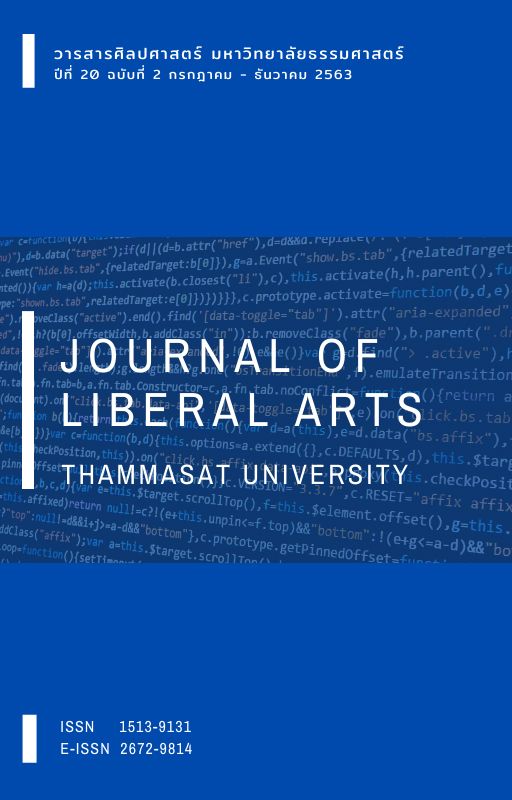ความมั่นใจสูงล้น การจัดการผิดพลาด และหายนะโรคระบาดโควิด-19 ในสหภาพยุโรป
Main Article Content
บทคัดย่อ
บทความนี้ต้องการวิเคราะห์สาเหตุการระบาดของไวรัสโคโรนาหรือโควิด-19 ในประเทศสมาชิกสหภาพยุโรปในช่วงเวลาตั้งแต่เดือนมกราคมถึงเดือนมีนาคม ค.ศ. 2020 ภายหลังที่ไวรัสเริ่มระบาดในจีนในปลาย ค.ศ. 2019
ผลการศึกษาพบว่า ผู้นำประเทศสมาชิกและสหภาพยุโรปเห็นว่า ไวรัสสายพันธ์ใหม่นี้เป็นเรื่องห่างไกล จึงไม่มีการเตรียมพร้อมด้านสาธารณสุข เมื่อการแพร่ระบาดลุกลามอย่างรวดเร็วไปทั่วทั้ง 27 ประเทศสมาชิกในเวลาอันสั้น รัฐบาลแทบทั้งหมดจึงเพิ่งรู้ว่าประเทศขาดแคลนอย่างรุนแรงทั้งบุคคลากรการแพทย์ คลังสำรองอุปกรณ์การแพทย์ และเตียงรักษาผู้ป่วย กระนั้นก็ตาม รัฐบาลต่าง ๆ ไม่ได้ใช้มาตรการร่วมในการรับมือกับภัยคุกคามสุขภาพข้ามเขตแดน แต่กลับใช้มาตรการชาติที่แตกต่างและขัดแย้งกัน การใช้มาตรการปิดเมืองเพื่อควบคุมโรคได้ส่งผลกระทบต่อความสัมพันธ์ระหว่างประเทศสมาชิก รวมทั้งผลเสียหายต่อโครงการสำคัญของสหภาพยุโรป โดยเฉพาะอย่างยิ่ง ตลาดร่วมยุโรปและการเคลื่อนย้ายเสรีภายใต้ข้อตกลงเชงเกน สหภาพยุโรปแทบไม่มีบทบาทในช่วงแรกเพราะมีอำนาจจำกัดในด้านสาธารณสุข อย่างไรก็ตาม การกำหนดมาตรการร่วมของยุโรปได้เริ่มขึ้นอย่างจริงจังตั้งแต่ครึ่งหลังของเดือนมีนาคมเมื่อผู้นำรัฐบาลสมาชิกเห็นพ้องถึงความจำเป็นต้องใช้มาตรการร่วมของยุโรปในการจัดการภัยพิบัติข้ามเขตแดน วิกฤติครั้งนี้จึงซ้ำรอยกับประสบการณ์ในอดีตที่ประเทศสมาชิกมักแตกแยกกัน เมื่อเผชิญกับวิกฤติข้ามเขตแดน การขาดความสามัคคีในสหภาพที่พึ่งพากันสูงมากนี้จึงเป็นปัญหาสำคัญในการจัดการวิกฤติแทบทุกครั้งของสหภาพยุโรป
Downloads
Article Details
เอกสารอ้างอิง
จุฬาพร เอื้อรักสกุล. (2561). ประวัติศาสตร์สหภาพยุโรป ค.ศ. 1951-1992. กรุงเทพฯ: สำนักพิมพ์แห่งจุฬาลงกรณ์มหาวิทยาลัย.
จุฬาพร เอื้อรักสกุล. (2562). วิกฤติผู้อพยพยุโรป ค.ศ. 2015-2016: “การต่อสู้แข่งกับเวลา” ของสหภาพยุโรปเพื่อรักษาข้อตกลงเชงเกน. วารสารประวัติศาสตร์ ธรรมศาสตร์, 6(1), 169-218.
จุฬาพร เอื้อรักสกุล. (2563). องค์กรเหนือชาติกับการบริหารเส้นเขตแดนรัฐ: กรณีศึกษา “พื้นที่เชงเกน” (รายงานการวิจัย). คณะศิลปศาสตร์ มหาวิทยาลัยธรรมศาสตร์.
Alemanno, A. (2020). Testing the Limits of EU Health Emergency Power. Retrieved from https://www.printfriendly.com/p/g/cD9dix
Amnesty International. (2020). Explained: The situation at Greece’s borders. Retrieved from https://www.amesty.org>news>2020/03/05
BBC. (2020a). Europe now epicenter of the pandemic, says WHO. Retrieved from https://www.bbc.com>news>world.
BBC. (2020b). Hope as Italy records first fall in active virus. Retrieved from https://www. bbc.com>news>world.
Bergner, S. (2020). The EU’s Global Health Crisis Management: Past and Present. Retrieved from https://www.e-ir.info/2020/04/17/the-eus-global-health-crisis-management-the-past-the-present/
ECDC (European Centre for Disease Prevention and Control). (2020). Resurgence of reported cases of COVID-19 in the EU/EEA, the UK and EU candidate and potential candidates – 2 July 2020. ECDC: Stockholm.
ECOC. (2020). Event background COVID-19. Retrieved from http://www.eurosurveillance.org
Euractiv. (2020). Europeans disillusioned with EU coronavirus response, new poll finds. Retrieved from https://www.euractiv.com/section/politics/news/europeans-disillusioned-with-eu-coronavirus-response-new-poll-finds/
European Commission. (2020). Crisis preparedness and response. Retrieved from https://ec.europa.eu/health/preparedness_response/crisis_management_en
European Parliament. (n.d.). Fact sheets on the European Union. Retrieved from https://www.europar.europa.eu/factsheets/en/sheet/49/public-health.
European Union. (2020). The common EU response to COVID-19. Retrieved from https://ec.europa.eu/info/live-work-travel-eu/health/coronavirus-response_en
Fahy, G. et al. (Eds.). (2019) Everything you always wanted to know about European Union health policies but were afraid to ask. Copenhagen (Denmark): European Observatory on Health Systems and Policies. Health Policy Series No. 54. Retrieved from https://www.ncbi.nlm.nih.gov/books/NBK551073/
Gross, E., & Juncos, A. E. (2010). EU conflict prevention and crisis management: Roles, institution, and policies. Routledge.
Hackenbroich, J. et al. (2020). Health Sovereignty: how to build a resilient European Response to pandemic. Retrieved from https://www.ecfr.eu/publications/summary/health_sovereignty_how_to_build_a_resilient_european_response_to_pandemic
Henley, J., & Jones, S. (2020). ‘Do not let this fire burn’: WHO warns Europe over Covid-19. The Guardian. 13 Mar 2020. Retrieved from https://www.theguardian.com/world/2020/mar/13/european-countries-take-radical-steps-to-combat-coronavirus
Herszenhorn, D. M., & Wheaton, S. (2020). How Europe failed the coronavirus test. Politico. Retrieved from https://www.politico.eu/article/coronavirus-europe-failed-the-test/
Jordana, J., & Trivino-Salazar, J. C. (2020). Where are the ECDC and the EU-wide responses in the COVID-19 pandemic?. Retrieved from https://doi.org/10.1016/S0140-6736(20)31132-6
Loss, R., & Puglierin, J. (2020). The truth about European solidarity during corona. Retrieved from https://www.ecfr.eu/article/commentary_the_truth_about_european_solidarity_during_corona
Russack, S., & Blockmans, S. (2020), How is EU cooperation on the Covid-19 crisis perceived in member states?. Retrieved from https://www.ceps.eu
Wikipedia. (2020a). COVID-19 pandemic in Europe. Retrieved from https://en.m.wikipedia.org>wiki
Wikipedia. (2020b). European Union response to the COVIC-19 pandemic. Retrieved from https://en.wikipedia.org/wiki/European_Union_response_to_the_COVIC-19_pandemic
Siegfried, K. (2020). The Refugee Brief. Retrieved from https://www.unhcr.org/refugeebrief/the-refugee-brief–9-march-2020
Zerka, P. (2020). In sickness and in health: European Cooperation during the coronavirus crisis. Retrieved fromhttps://www.ecfr.eu/publications/summary/in_sickness_and_in_health_european_cooperation_during_the_coronavirus_crisis


